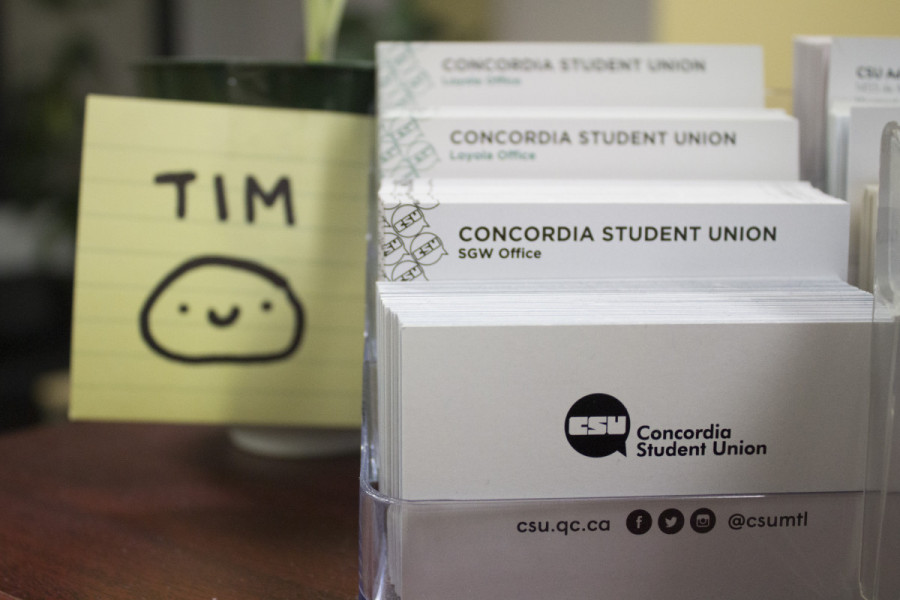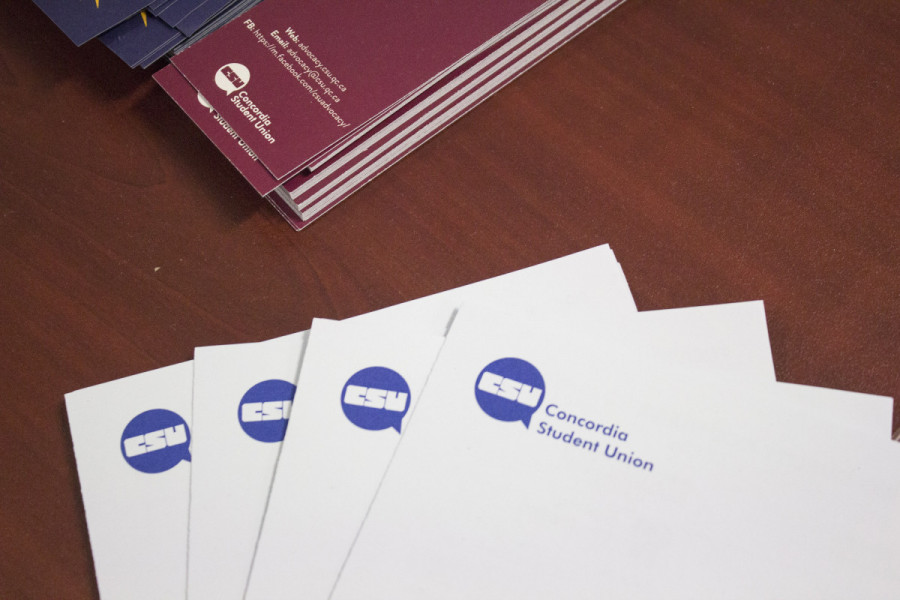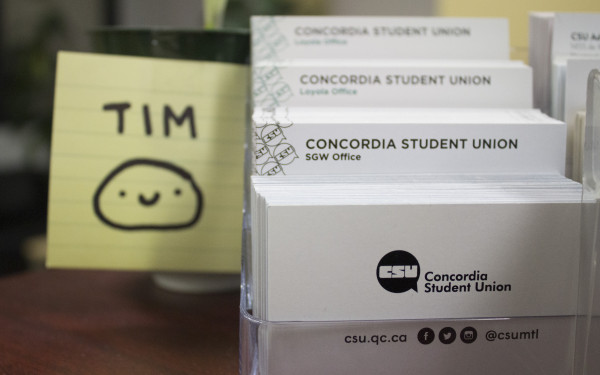CSU councillor against motion for more representation on committees
Some councillors say situation points to a toxic work environment, larger need for systemic change
Councillor Tzvi Hersh Filler objected to a motion to include more diversity and representation on Concordia Student Union committees during a CSU council meeting on Sept.16.
According to the Standing Regulations, a CSU committee typically has four seats. However, council can vote to add on another seat.
Most of the CSU committee seats are presently occupied by white people. Councillor S Shivaane, who presented the committee diversity motion, advocated for four committees that have a lack of representation to have additional seats added onto them. These seats would be open to gender non-conforming students, women, Black, Indigenous, and students of colour, as well as students within the LGBTQ+ community.
Shivaane’s decision to present the motion was also in reaction to questionable behaviours certain councillors had expressed during the summer. Many councillors “said really racist and insensitive things,” and generally did not paid any heed to the popular rise of support to the Black Lives Matter movement, she said.
After the motion was seconded, Filler immediately critiqued it as it “violates article 10 of the Quebec Charter of Human Rights and Freedoms.” Article 10 of the Charter stipulates that it is forbidden to discriminate on the basis of race, gender, colour, or sexual orientation, he said. Since Shivaane’s motion “barred certain people from applying”—in this case, cis-gendered straight white men—it essentially discriminated against them, he continued.
He did acknowledge that Article 20 in the Charter of Rights stipulates that a preference for a specific ethinc group is deemed “non-discriminatory” in certain instances—like when the National Association for the Advancement of Colored People decides to only hire Black people. However, he said he didn’t feel like this article applied in this case.
Filler suggested the matter be taken up with an external lawyer to determine whether or not Shivaane’s motion was out-of-order.
General Coordinator Isaiah Joyner objected, arguing the steep legal fees would be unnecessary.

“Given the political climate, and all the systemic racism and barriers that people are facing, we’re here to give people these opportunities so that we can hopefully reflect it in the world around us,” he added.
“You can’t discriminate against a white man,” added Internal Affairs Coordinator Daniel Amico.
Academic & Advocacy Coordinator Sarah Mazhero said it would be a waste of legal fees, and it was questionable that the issue was being brought up again by another white person.
“I don’t identify as white!” Filler loudly exclaimed, interrupting her.
“There is not a single Hasidic person on those committees,” he added. “This motion wants to keep it that way.”
“This is a disappointing discussion of who has suffered the most,” she said. “Every meeting has to be a debate and that’s highly problematic. Maybe more training needs to be done for certain people. Every meeting I come and every meeting I’m disrespected. This is about minorities coming together and advocating for issues.”
“The CSU is supposed to be advocating for minorities, it is in our mission statement. Therefore we should be helping to commit to this. We should be doing a lot of equality opportunities and consistently focusing on equality, diversity and inclusion,” she added. “Currently on the union, inclusiveness is generally lacking and so, for me, it would be a waste of legal fees to be advised about something we already know the answer to.”
Despite FIller’s objections and pushing the vote to a secret ballot, the motion was ultimately passed without the requirement of additional advice from a lawyer.
A symptom of a larger toxic work environment
Margot Berner, who vocally objected FIller’s concerns during the Sept. 16 meeting, told The Link that the incident points towards a larger trend of toxicity at the CSU. Filler’s objections had her feeling impatient, she said, as this was an issue that had come up time and time again.
The CSU has a structural issue where certain members are allowed to bully people out their jobs, she said.
“There are a number of folks on council who would rather engage in discussions of racism as intellectual debates rather than as pressing social issues that deserve respect.” —S Shivaane
“There is space allowed for the people who will give a free pass to their buddies when they do something that is illegal, but go out of their way to find any possible interpretation of policy to block or delay motions dealing with anti-racism or misogyny,” she said.
Berner is referring to a situation from 2019, when the internal coordinator at the time, Princess Somefun—a Black woman—resigned due to targeted harassment. James Hanna, one of the councillors involved in enacting that harassment, is still on council.
“It might not come from a malicious place, but these things don’t need to be malicious to be harmful and to wear you down,” Berner said.
“As a minority, I find it tiring to constantly have arguments about this when there are more pressing issues,” said Mazhero. She mentions how white councillors usually don’t face the same amount of objections, even whilst promoting motions similar to Shivaane’s.
Not only does it contribute to a toxic environment, but it also hinders the effectiveness of the CSU in general. Motions like Shivaane’s ultimately make the union better, she said.
She points to other universities where the student unions have adapted similar measures. Specifically, how the Ontario College of Art and Design have their own quota of minority representation in their union—for example, one seat for an Indigenous person, one seat for a Black person.
_900_642_90.jpg)
“Why can’t the CSU do the same thing?” she asked.
Mazhero echoes Berner in suggesting Filler’s comments point to a larger trend of general insensitivity in the CSU, recounting an instance when Filler—at the time of George Floyd’s death—said he was “a dude” who got knelt on, while referring to the incident. Mazhero found it disrespectful that Floyd was referred to as “a dude” rather than having his name used.
Even though Filler apologized, “it just shows that there’s a general lack of awareness on how to speak about racial and cultural issues,” she said.
“There are a number of folks on council who would rather engage in discussions of racism as intellectual debates rather than as pressing social issues that deserve respect,” Shivaane said.
“When their behaviour is chastised, these councillors become petulant, making hypocritical accusations that council officers who face these discriminations are acting in bad faith for not tolerating ignorance,” Shivaane said. “One of [the] things these behaviours are good at is completely tackering you out and making you wonder if you should just quit.”
As someone “from a different country with limited civil liberties,” she thinks there is so much opportunity within the CSU. But due to her motions constantly receiving some sort of objection, she feels a slight imposter syndrome and often wonders if she even has a place in council. Even though she attempts to keep her chin up and push through it, she sometimes finds herself feeling hopeless.
Mazhero thinks there needs to be more cultural sensitivity training, and changes to make the council more representative.
“We need to start including more POC and more minorities into the decision making that’s happening at the union in order to promote change,” she said.
Berner suggests that there should be robust accountability measures put in place so that the onus is not on marginalized people to call out discrimination when they experience it.
“People of Colour—in particular, Black and Indigenous people—need to be able to call a racist a racist without being accused of bullying and name calling or being afraid of the fallout from being whistleblowers,” she said.
Filler did not respond to a request for comment.
Updated for clarity







